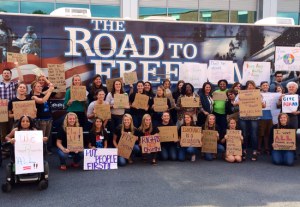In December of 2014, 49-year-old Katherine Lavoie was shot by her husband. A month earlier, 29-year-old Daryne Gailey and 6-year-old London McCabe were both killed by their parents.
In the year since our last vigil, our community has lost at least twenty more victims.
In the past five years, over seventy people with disabilities have been murdered by their parents.
 Sunday, March 1st, the disability community will gather across the nation to remember victims of filicide: people with disabilities murdered by their family members or caregivers.
Sunday, March 1st, the disability community will gather across the nation to remember victims of filicide: people with disabilities murdered by their family members or caregivers.
We see the same pattern repeating over and over again. A parent kills their child with a disability. The media portrays these murders as justifiable and inevitable due to the “burden” of having a person with a disability in the family. If the parent stands trial, they are given sympathy and comparatively lighter sentences, if they are sentenced at all. The victims are disregarded, blamed for their own murder at the hands of the person they should have been able to trust the most, and ultimately forgotten. And then the cycle repeats.
But it doesn’t have to.
Here’s what you can do in your own community to help spread awareness of these tragedies – and help stop more from happening.
1. Read and share the new Anti-Filicide Toolkit.
This toolkit is intended to provide advocates and allies with concrete tools and resources to use in their own communities, including in response to local incidents. The toolkit includes information about how to understand and respond to filicide, frequently asked questions about filicide, and a guidebook for Day of Mourning vigil site coordinators.
2. Sign up to be a Day of Mourning vigil site coordinator
For the last four years, ASAN, ADAPT, Not Dead Yet, the National Council on Independent Living, the Disability Rights Education & Defense Fund, and other disability rights organizations have come together to mourn the lives lost to filicide, bring awareness to these tragedies, and demand justice and equal protection under the law for all people with disabilities.
On Sunday, March 1, 2015, ASAN and the wider disability community will be holding vigils to mourn the lives of those we’ve lost and bringing awareness to this horrific trend of violence against our community.
If you’re interested in leading a vigil in your area, please sign up to be a Day of Mourning vigil site coordinator using the link above.
NCIL thanks the Autistic Self Advocacy Network (ASAN) for their leadership and contributing the majority of the content of this article.




